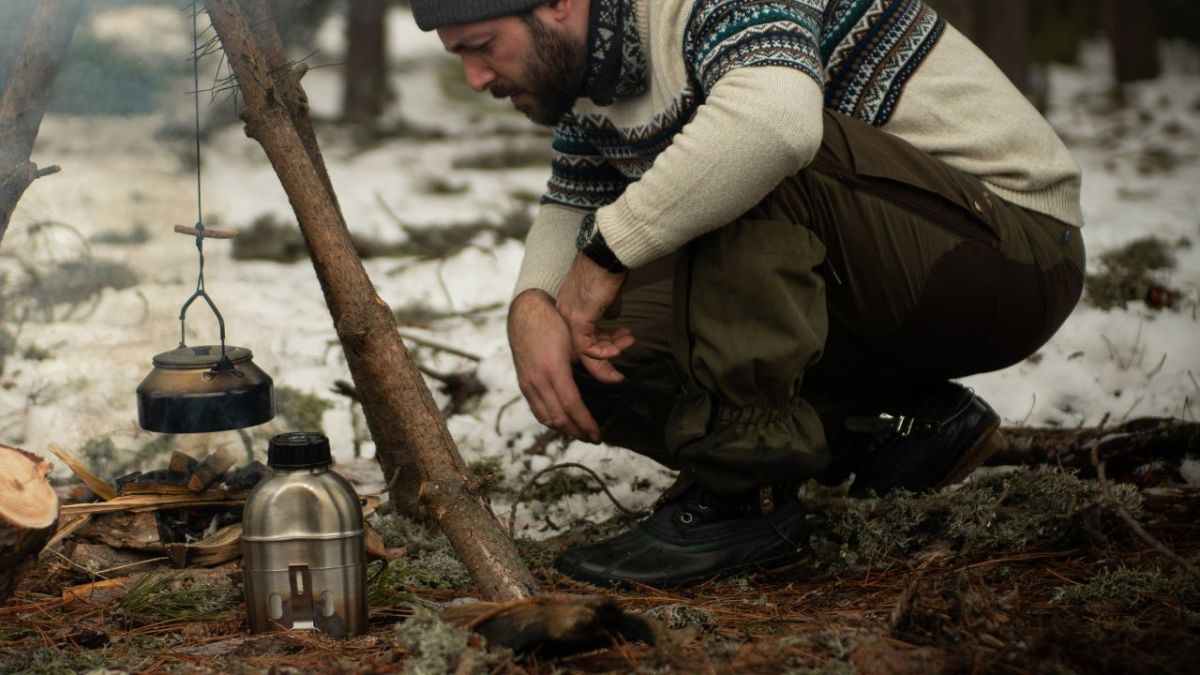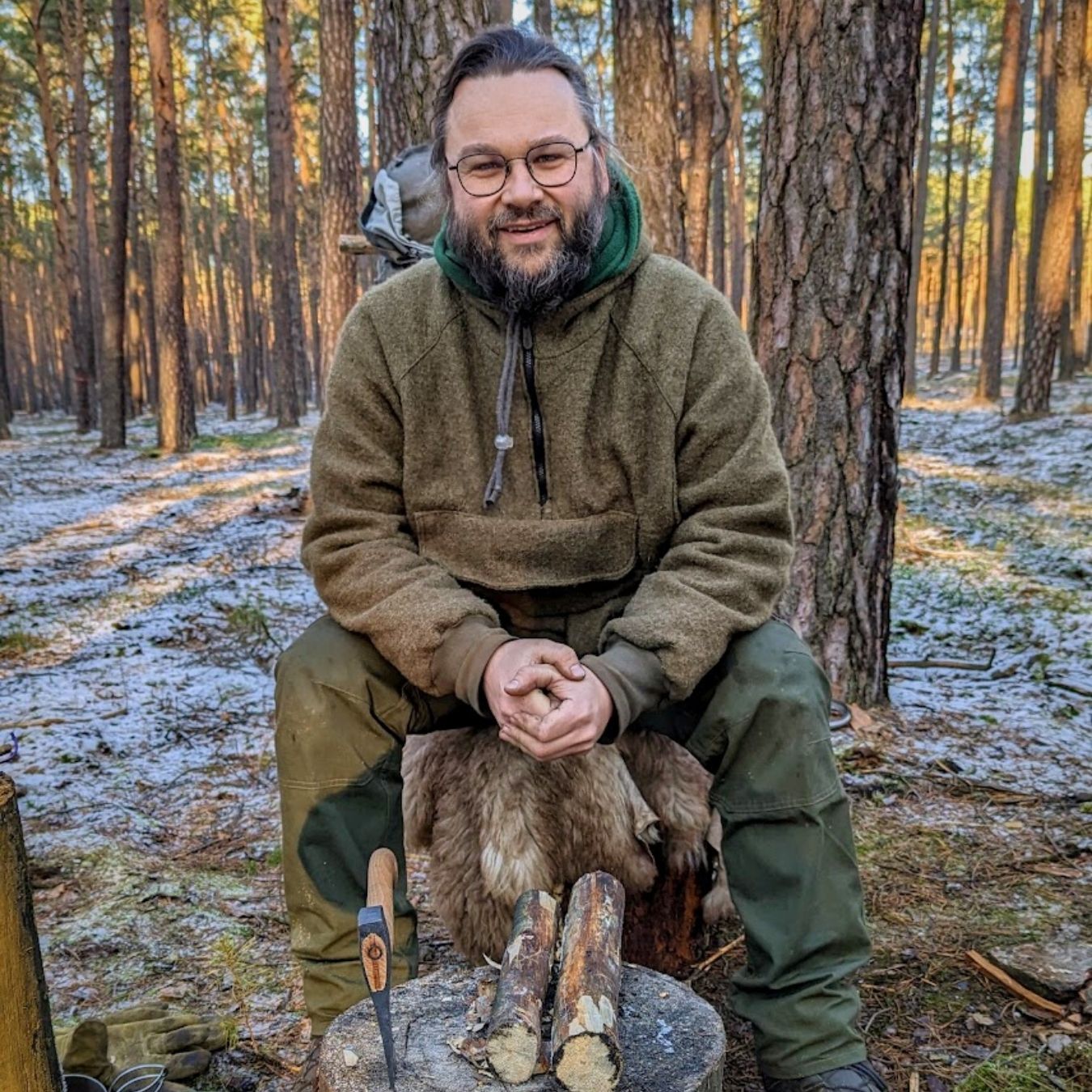
Bushcraft
Nomen
Meaning
Bushcraft is the art of thriving in the wilderness by utilizing skills and knowledge of the natural environment. It encompasses a wide range of abilities, including fire-making, shelter-building, foraging, and navigation. Bushcraft is all about self-reliance and resourcefulness, enabling you to survive and thrive in the great outdoors.
In the context of survival, bushcraft is essential as it equips you with the necessary skills to overcome challenges and emergencies in the wilderness. It allows you to adapt to your surroundings, make use of available resources, and ultimately increase your chances of survival.
Whether you're camping, hiking, or simply exploring nature, bushcraft is a valuable skill set that enhances your outdoor experience. It empowers you to connect with the natural world, develop a deeper understanding of your environment, and foster a sense of self-sufficiency.

Examples
„Bushcraft is the art of thriving in the wilderness by using your skills and knowledge of nature. It involves various techniques such as building shelters, starting fires, and foraging for food and water. With bushcraft, you can truly connect with the natural world and become self-reliant.“
„"I love practicing bushcraft because it allows me to immerse myself in nature and learn valuable survival skills."“
„"During my bushcraft training, I learned how to identify edible plants and mushrooms, which is essential for sustainable foraging."“
„"When I go camping, I always bring my bushcraft gear, including a reliable knife, fire starter, and tarp for building a shelter."“
„"Bushcraft is not just about survival; it's also about appreciating the beauty of the wilderness and living in harmony with nature."“
„"I enjoy sharing my bushcraft knowledge with others and teaching them how to navigate through the woods and find resources for survival."“
Origin
Bushcraft is a term that originated in Australia and New Zealand, but its roots can be traced back to the early 20th century. It is a combination of the words "bush" and "craft," referring to the skills and knowledge required to thrive in the wilderness.
The concept of bushcraft was developed by early settlers and explorers who had to rely on their resourcefulness and ingenuity to survive in the harsh and unforgiving environments of the bush. These pioneers had to learn how to build shelters, find food and water, navigate through dense forests, and make tools and equipment from natural materials.
Over time, bushcraft evolved into a comprehensive set of skills that encompass various aspects of wilderness survival and self-sufficiency. It draws inspiration from indigenous cultures and traditional practices, as well as modern outdoor and survival techniques.
Today, bushcraft has gained popularity worldwide, with enthusiasts and practitioners honing their skills in outdoor activities such as camping, hiking, and survival training. It has become a way of reconnecting with nature, learning to live in harmony with the environment, and embracing a simpler and more self-reliant lifestyle.
Synonyms
Wilderness skills, Outdoor survival, Primitive living, Woodcraft, Nature craft, Survivalism, Backcountry skills, Primitive technology
Antonyms
Urban living, Modern technology, City life, Convenience, Comfort, Reliance on others, Lack of self-sufficiency, Disconnection from nature
Relatives
Wilderness survival, Outdoor skills, Primitive living, Nature craft, Survival skills, Foraging, Shelter building, Fire making
Historical and cultural importance
Bushcraft is a term that originated from the indigenous people of Australia, known as the Aboriginals. For thousands of years, the Aboriginals have lived in harmony with nature, relying on their knowledge and skills to survive in the harsh Australian bush. Bushcraft encompasses a wide range of skills and techniques that are essential for living and thriving in the wilderness.
In recent years, bushcraft has gained popularity worldwide, as people seek to reconnect with nature and learn the skills necessary for self-reliance in the outdoors. It has become a way of life for many outdoor enthusiasts, survivalists, and adventurers.
Bushcraft is not just about survival, but also about understanding and respecting the natural world. It teaches us to be resourceful, to use what nature provides, and to leave no trace behind. It is a way of living in harmony with the environment, using traditional knowledge and modern techniques to thrive in the wilderness.
Through bushcraft, we learn how to build shelters, start fires, find and purify water, navigate without a compass, identify edible plants, and hunt or gather food. These skills are not only practical but also empower us to connect with our primal instincts and develop a deeper appreciation for the natural world.
Overall, bushcraft is a testament to the resilience and ingenuity of humanity. It is a living tradition that has been passed down through generations, adapting to different environments and cultures. By embracing bushcraft, we can learn valuable skills, gain self-confidence, and develop a profound respect for nature.
More information about the term Bushcraft
What is Bushcraft?
Bushcraft is the art of thriving in the wilderness by using traditional skills and knowledge of the natural environment. It is about living in harmony with nature, relying on your own abilities and resources to survive and thrive in the great outdoors. Bushcraft is not just about survival, but also about connecting with nature, learning from it, and developing a deep respect for the natural world.
The Origins of Bushcraft
Bushcraft has its roots in ancient civilizations and indigenous cultures around the world. It draws inspiration from the practices and techniques used by our ancestors to survive and thrive in the wilderness. From fire-making to shelter-building, foraging for food to tracking animals, bushcraft encompasses a wide range of skills that have been passed down through generations.
Essential Bushcraft Skills
There are several key skills that every bushcrafter should master:
- Firecraft: Being able to start a fire is crucial for warmth, cooking, and purifying water. Bushcrafters learn various methods of fire-making, such as using a fire bow, flint and steel, or a magnifying glass.
- Shelter Building: Knowing how to construct a shelter using natural materials is essential for protection against the elements. Bushcrafters learn to build different types of shelters, such as debris huts, lean-tos, or tarp shelters.
- Water Sourcing and Purification: Finding and purifying water is vital for survival. Bushcrafters learn to identify water sources, collect and filter water, and make it safe for drinking.
- Foraging and Wild Edibles: Knowing how to identify and gather wild edible plants, mushrooms, and other food sources is crucial for sustaining oneself in the wilderness. Bushcrafters learn to recognize edible plants and practice ethical foraging.
- Navigation: Being able to navigate without the use of modern technology is an important skill. Bushcrafters learn to read maps, use a compass, and navigate using natural landmarks and celestial bodies.
- Tool Craft: Making and using tools from natural materials is a fundamental bushcraft skill. Bushcrafters learn to craft tools such as knives, bows, and arrows, and use them for various tasks.
The Benefits of Bushcraft
Bushcraft offers numerous benefits beyond survival skills:
- Self-Reliance: Bushcraft teaches you to rely on your own abilities and resources, fostering self-confidence and independence.
- Connection with Nature: Spending time in nature and learning from it helps develop a deep connection and appreciation for the natural world.
- Stress Relief: Being in nature and engaging in bushcraft activities can reduce stress and promote mental well-being.
- Environmental Awareness: Bushcraft promotes sustainable practices and a greater understanding of the impact humans have on the environment.
- Practical Skills: Many bushcraft skills have practical applications in everyday life, such as fire-making, knot tying, and tool use.
Whether you are an outdoor enthusiast, a survivalist, or simply someone who wants to reconnect with nature and learn valuable skills, bushcraft offers a rewarding and enriching experience. It allows you to step outside your comfort zone, embrace the challenges of the wilderness, and develop a deeper understanding of yourself and the natural world.
Back to overview

